 24 citations,
January 2018 in “International Journal of Trichology”
24 citations,
January 2018 in “International Journal of Trichology” Tofacitinib helped regrow hair in patients with alopecia, with few side effects.
 1 citations,
October 2023 in “Clinical, cosmetic and investigational dermatology”
1 citations,
October 2023 in “Clinical, cosmetic and investigational dermatology” Traditional treatment for pediatric alopecia areata is most effective and should be first choice.
 May 2023 in “Journal of Clinical Medicine”
May 2023 in “Journal of Clinical Medicine” New understanding and treatments for hair loss are improving, but more research is needed.
 October 2022 in “JAAD international”
October 2022 in “JAAD international” Most patients with autoimmune blistering diseases experienced some hair loss, which may be underreported and linked to disease severity.
 57 citations,
April 2019 in “British journal of dermatology/British journal of dermatology, Supplement”
57 citations,
April 2019 in “British journal of dermatology/British journal of dermatology, Supplement” Alopecia areata involves immune system imbalances that may lead to depression and anxiety.
 January 2021 in “International journal of basic and clinical pharmacology”
January 2021 in “International journal of basic and clinical pharmacology” Hydroxychloroquine is less effective than betamethasone oral mini pulse therapy for treating alopecia areata.
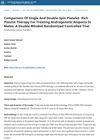 January 2025 in “Journal of Bacha Khan Medical College.”
January 2025 in “Journal of Bacha Khan Medical College.” Double-spin PRP is more effective for treating male pattern baldness.
 April 2024 in “Dermatology and therapy”
April 2024 in “Dermatology and therapy” There are significant gaps and inconsistencies in diagnosing and treating alopecia areata in Greece and Italy.
 3 citations,
February 2022 in “Rheumatology”
3 citations,
February 2022 in “Rheumatology” Baricitinib was effective in treating a patient with dermatomyositis and hair loss.
 10 citations,
January 2023 in “Journal of the European Academy of Dermatology and Venereology”
10 citations,
January 2023 in “Journal of the European Academy of Dermatology and Venereology” Alopecia areata greatly affects people's life quality, mental health, and work life.
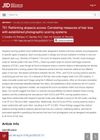 July 2022 in “Journal of Investigative Dermatology”
July 2022 in “Journal of Investigative Dermatology” The conclusion suggests that a new system for measuring hair loss could be created using automated analysis of photographs.
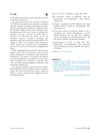 January 2018 in “Journal of the American Academy of Dermatology”
January 2018 in “Journal of the American Academy of Dermatology” Combining pulsed prednisone with tofacitinib can lead to lasting hair regrowth in severe alopecia areata patients.
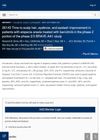 1 citations,
August 2021 in “Journal of The American Academy of Dermatology”
1 citations,
August 2021 in “Journal of The American Academy of Dermatology” Baricitinib helped improve hair, eyebrow, and eyelash growth in alopecia areata patients.
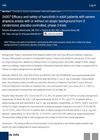 3 citations,
September 2022 in “Journal of the American Academy of Dermatology”
3 citations,
September 2022 in “Journal of the American Academy of Dermatology” Baricitinib is effective and safe for severe alopecia areata, working similarly with or without an atopic background.
 June 2022 in “Frontiers in Immunology”
June 2022 in “Frontiers in Immunology” Tofacitinib regrew hair in a man with total hair loss but raised cytokine levels, needing more research on possible side effects.
 January 2018 in “Springer eBooks”
January 2018 in “Springer eBooks” PDE inhibitors, especially PDE4 inhibitors like apremilast, are effective for certain inflammatory skin conditions but have side effects and can be costly.
 June 2023 in “British Journal of Dermatology”
June 2023 in “British Journal of Dermatology” Baricitinib was effective and safe for severe hair loss treatment over 6 months.
 2 citations,
January 2018 in “International journal of research in dermatology”
2 citations,
January 2018 in “International journal of research in dermatology” Intralesional corticosteroids are the best for limited alopecia areata, oral steroids are less effective, and PRP is safe and promising, especially for children and severe cases.
 15 citations,
January 2018 in “Annals of Dermatology”
15 citations,
January 2018 in “Annals of Dermatology” Wigs significantly improve the well-being of people with severe hair loss.
 June 2023 in “British Journal of Dermatology”
June 2023 in “British Journal of Dermatology” Baricitinib was effective in treating severe and very severe alopecia areata after 52 weeks.
 June 2024 in “JEADV Clinical Practice”
June 2024 in “JEADV Clinical Practice” Severe alopecia areata patients have a low chance of spontaneous hair regrowth.
 December 2021 in “Benha Journal of Applied Sciences”
December 2021 in “Benha Journal of Applied Sciences” Higher Claudin 3 levels in the blood are linked to more severe alopecia areata.
 6 citations,
May 2023 in “Drugs”
6 citations,
May 2023 in “Drugs” Baricitinib helps regrow hair in adults with severe alopecia better than a placebo and is approved for treatment, but long-term effects are still unknown.
 124 citations,
October 2019 in “Frontiers in Immunology”
124 citations,
October 2019 in “Frontiers in Immunology” Janus kinase inhibitors are promising treatments for autoimmune skin diseases like eczema and psoriasis.
 1 citations,
January 2022 in “The Egyptian Journal of Hospital Medicine ”
1 citations,
January 2022 in “The Egyptian Journal of Hospital Medicine ” Cryotherapy and steroid injections are similarly effective and safe for treating alopecia areata.
 13 citations,
May 1996 in “Archives of Disease in Childhood”
13 citations,
May 1996 in “Archives of Disease in Childhood” Siblings with signs of virilization should be tested for non-classical congenital adrenal hyperplasia, which does not affect adult height but may impact fertility and well-being if untreated.
 16 citations,
September 2008 in “Dermatologic Therapy”
16 citations,
September 2008 in “Dermatologic Therapy” CAH is a genetic disorder affecting cortisol production and causing hormonal imbalances, with treatment and diagnosis varying by form and symptoms.
 November 2024 in “Journal of Cosmetic Dermatology”
November 2024 in “Journal of Cosmetic Dermatology” The plant extracts may help treat hair loss by promoting hair growth and reducing DHT levels.
 1 citations,
December 2022 in “JAMA Dermatology”
1 citations,
December 2022 in “JAMA Dermatology” The AI system HairComb accurately scores hair loss severity, matching dermatologist assessments.
 11 citations,
August 2019 in “The Journal of Sexual Medicine”
11 citations,
August 2019 in “The Journal of Sexual Medicine” Women with nonclassic congenital adrenal hyperplasia experience more sexual dysfunction and distress.






























